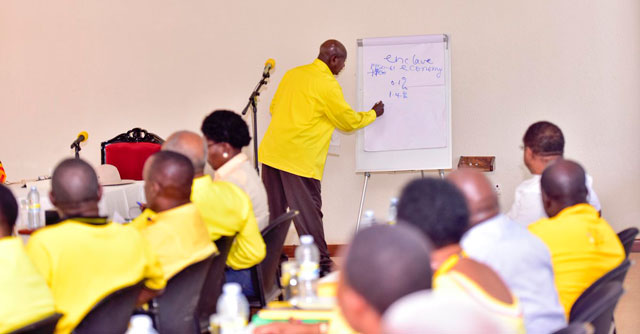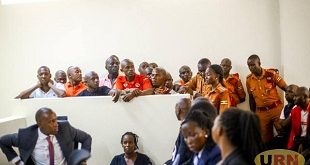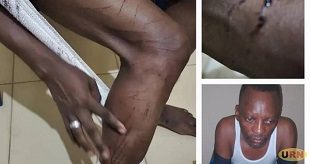
Kampala, Uganda | THE INDEPENDENT | While the Central Executive Committee (CEC) is simply listed as the second highest organ of the National Resistance Movement-NRM party after the National Delegates Conference, it is increasingly turning out as the most powerful.
Ever since NRM was registered as a political party in 2004, the country has known little of what takes place inside the Central Executive Committee. This year, thanks to COVID-19 which required an online meeting, what goes on in CEC is finally in the light.
CEC is made of the chairman of the party who is Museveni, his two national vice-chairpersons, Haj Moses Kigongo and Rebecca Kadaga, regional chairpersons; Haj Abdul Nadduli (Buganda), Capt. Mike Mukula (Eastern), Gen. Matayo Kyaligonza (western), Sam Engola (Northern), Godfrey Amooti Nyakana (Kampala), and Simon Peter Aleper (Karamoja).
They are joined by Secretary-General Justine Kasule Lumumba, her deputy Richard Todwong, the treasurer, Rosemary Namayanja Nsereko, chairpersons of leagues such as the Nasur Gadhafi (Youth), Lydia Wanyoto (women), Jim Muhwezi (veterans) Prime Minister Dr Ruhakana Rugunda, and government chief whip Ruth Nankabirwa, among others.
According to the NRM constitution, CEC performs functions such as providing and exercising political leadership in the country, formulating policy for consideration by the National Executive Conference (NEC), supervise the day to day conduct of the NRM’s activities appoint organizational functionaries from amongst members of NRM and propagate the NRM policies.
CEC also recommends candidates seeking nomination for the offices of National Chairperson, Vice-Chairperson, Secretary-General, Deputy Secretary-General and National Treasurer and Presidential candidate for NRM; implement the decisions of the National Conference and NEC among others. However, in the performance of these functions including vetting, CEC always does them in-camera.
But thanks to COVID-19 whose restrictions, among others, include social distancing, CEC met to vet candidates who want to be part of it, on Tuesday.
The non-incumbents were at the NRM secretariat at plot 10 Kyadondo Road in Kampala while the members were in State House Entebbe. It’s at Kyadondo that journalists were allowed to be part of the proceedings hence availing them the opportunity to know what happens.
According to Emmanuel Dombo, the Director for Public Relations and Media at the NRM secretariat, the vetting process is to allow CEC members to get to know the candidates before they are allowed to continue with the race.
Since journalists were watching from Kyadondo, they apparently muted the volume during the early bits of the session including the chairman’s speech, until candidates started introducing themselves.
CEC vs Museveni
It was clear even in this CEC session of the powerful role the chairman Museveni plays in the entire process, with candidates focussing on showing how they have helped the President.
From Kadaga, who wants to retain her position, Jacob Oulanya her deputy who wants to replace Engola; they were all reminding Museveni of how loyal they have been to him.
“Your excellency, remember when you met me in Gulu,” said Dr Odongo Oledo who also wants to replace Engola.
“Your Excellency speaking to you is the girl you met in Bakuli in Kampala, so many years ago,” said Florence Kintu Tumwine who is challenging Kyaligonza.
“Your Excellency it’s me Kefa Mafumo, the young man you identified from Bugisu and gave a job at State House,” said Kefa Mafumo who wants Kigongo’s job.
“Your Excellency, I have been part of this struggle ever since 1980 when I was a member of UPM,” said Capt. Francis Babu who wants to replace Kigongo. They went on and on, one after the other telling the President how they are the best candidates because of the history he has with them.
Ganging up against newcomers
It was reported that during last week’s CEC meeting, incumbents tried to ring-fence some positions and that Museveni tried to influence CEC members to allow his long-serving vice, Haj Moses Kigongo to go unopposed. He allegedly remarked that those standing against Kigongo were unknown and some of them had a tainted track record.
When URN asked Justine Lumumba about the veracity of these allegations, she roundly rejected them reasoning that everybody was free to contest with anybody. But according to Tuesday’s proceedings, there seemed to be a consensus that Mafumo should pull out of the race.
It was Dr Tanga Odoi, the party Electoral Commission chairman who fired the first shot.
“Mr Chairman I don’t know whether Mafumo is allowed to participate when I didn’t receive his letter of resignation,” Odoi said. Mafumo works in State House’s political department.
Although Mafumo was allowed to present his credentials, Ruth Nankabirwa brought back the issue immediately after.
In defence, Mafumo said there was no law barring him from contesting in partisan politics. He refused the reasoning from NRM lawyer Kiryowa Kiwanuka who said that because he draws his salary from the Consolidated Fund, he is, therefore, a public servant who must first resign to partake in the elections.
Mafumo added that if that were to be the proper interpretation, then, Maj. Gen. Matayo Kyaligonza who is an ambassador to Burundi and Dorothy Hyuha who is an ambassador to Kenya among others too wouldn’t qualify. At that point, the volume for those at Kyadondo was muted as those in Entebbe deliberated on the issue. The discussion went on for about two hours but the results were not communicated.
“Why would they raise this issue at this stage when somebody has already invested in the race,” wondered Persis Namuganza who is competing with Kadaga.
“Rules of the game are set at the beginning, not in the middle of the game,” added Deputy Speaker Jacob Oulanyah.
When it came to the time allotted to the candidates to present their credentials those vying for national vice chairmanship were given eight minutes. Those at Kyadondo the eight minutes were strictly observed whereas those at Entebbe overshot that time.
For other positions, candidates were given four minutes which were strictly enforced at Kyadondo but not at Entebbe. For example, Kyaligonza spoke for eight minutes and 40 seconds while Nadduli spoke for seven minutes and 18 seconds.
Successful candidates from this process will face the delegates on August 20. But to people like Namuganza, a process that requires contestants to vet contestants for the same positions can never be fair.
*****
URN
 The Independent Uganda: You get the Truth we Pay the Price
The Independent Uganda: You get the Truth we Pay the Price


